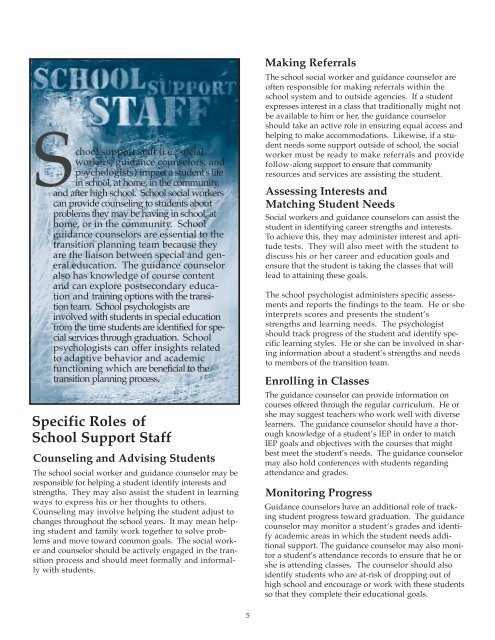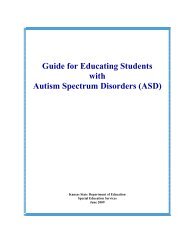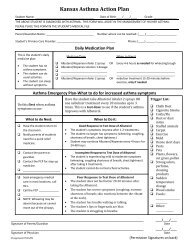People make it happen(PDF)1 - Families Together Inc.
People make it happen(PDF)1 - Families Together Inc.
People make it happen(PDF)1 - Families Together Inc.
Create successful ePaper yourself
Turn your PDF publications into a flip-book with our unique Google optimized e-Paper software.
School support staff (i.e., social<br />
workers, guidance counselors, and<br />
psychologists) impact a student's life<br />
in school, at home, in the commun<strong>it</strong>y,<br />
and after high school. School social workers<br />
can provide counseling to students about<br />
problems they may be having in school, at<br />
home, or in the commun<strong>it</strong>y. School<br />
guidance counselors are essential to the<br />
trans<strong>it</strong>ion planning team because they<br />
are the liaison between special and general<br />
education. The guidance counselor<br />
also has knowledge of course content<br />
and can explore postsecondary education<br />
and training options w<strong>it</strong>h the trans<strong>it</strong>ion<br />
team. School psychologists are<br />
involved w<strong>it</strong>h students in special education<br />
from the time students are identified for special<br />
services through graduation. School<br />
psychologists can offer insights related<br />
to adaptive behavior and academic<br />
functioning which are beneficial to the<br />
trans<strong>it</strong>ion planning process.<br />
Specific Roles of<br />
School Support Staff<br />
Counseling and Advising Students<br />
The school social worker and guidance counselor may be<br />
responsible for helping a student identify interests and<br />
strengths. They may also assist the student in learning<br />
ways to express his or her thoughts to others.<br />
Counseling may involve helping the student adjust to<br />
changes throughout the school years. It may mean helping<br />
student and family work together to solve problems<br />
and move toward common goals. The social worker<br />
and counselor should be actively engaged in the trans<strong>it</strong>ion<br />
process and should meet formally and informally<br />
w<strong>it</strong>h students.<br />
Making Referrals<br />
The school social worker and guidance counselor are<br />
often responsible for making referrals w<strong>it</strong>hin the<br />
school system and to outside agencies. If a student<br />
expresses interest in a class that trad<strong>it</strong>ionally might not<br />
be available to him or her, the guidance counselor<br />
should take an active role in ensuring equal access and<br />
helping to <strong>make</strong> accommodations. Likewise, if a student<br />
needs some support outside of school, the social<br />
worker must be ready to <strong>make</strong> referrals and provide<br />
follow-along support to ensure that commun<strong>it</strong>y<br />
resources and services are assisting the student.<br />
Assessing Interests and<br />
Matching Student Needs<br />
Social workers and guidance counselors can assist the<br />
student in identifying career strengths and interests.<br />
To achieve this, they may administer interest and apt<strong>it</strong>ude<br />
tests. They will also meet w<strong>it</strong>h the student to<br />
discuss his or her career and education goals and<br />
ensure that the student is taking the classes that will<br />
lead to attaining these goals.<br />
The school psychologist administers specific assessments<br />
and reports the findings to the team. He or she<br />
interprets scores and presents the student’s<br />
strengths and learning needs. The psychologist<br />
should track progress of the student and identify specific<br />
learning styles. He or she can be involved in sharing<br />
information about a student’s strengths and needs<br />
to members of the trans<strong>it</strong>ion team.<br />
Enrolling in Classes<br />
The guidance counselor can provide information on<br />
courses offered through the regular curriculum. He or<br />
she may suggest teachers who work well w<strong>it</strong>h diverse<br />
learners. The guidance counselor should have a thorough<br />
knowledge of a student’s IEP in order to match<br />
IEP goals and objectives w<strong>it</strong>h the courses that might<br />
best meet the student’s needs. The guidance counselor<br />
may also hold conferences w<strong>it</strong>h students regarding<br />
attendance and grades.<br />
Mon<strong>it</strong>oring Progress<br />
Guidance counselors have an add<strong>it</strong>ional role of tracking<br />
student progress toward graduation. The guidance<br />
counselor may mon<strong>it</strong>or a student’s grades and identify<br />
academic areas in which the student needs add<strong>it</strong>ional<br />
support. The guidance counselor may also mon<strong>it</strong>or<br />
a student’s attendance records to ensure that he or<br />
she is attending classes. The counselor should also<br />
identify students who are at-risk of dropping out of<br />
high school and encourage or work w<strong>it</strong>h these students<br />
so that they complete their educational goals.<br />
5





